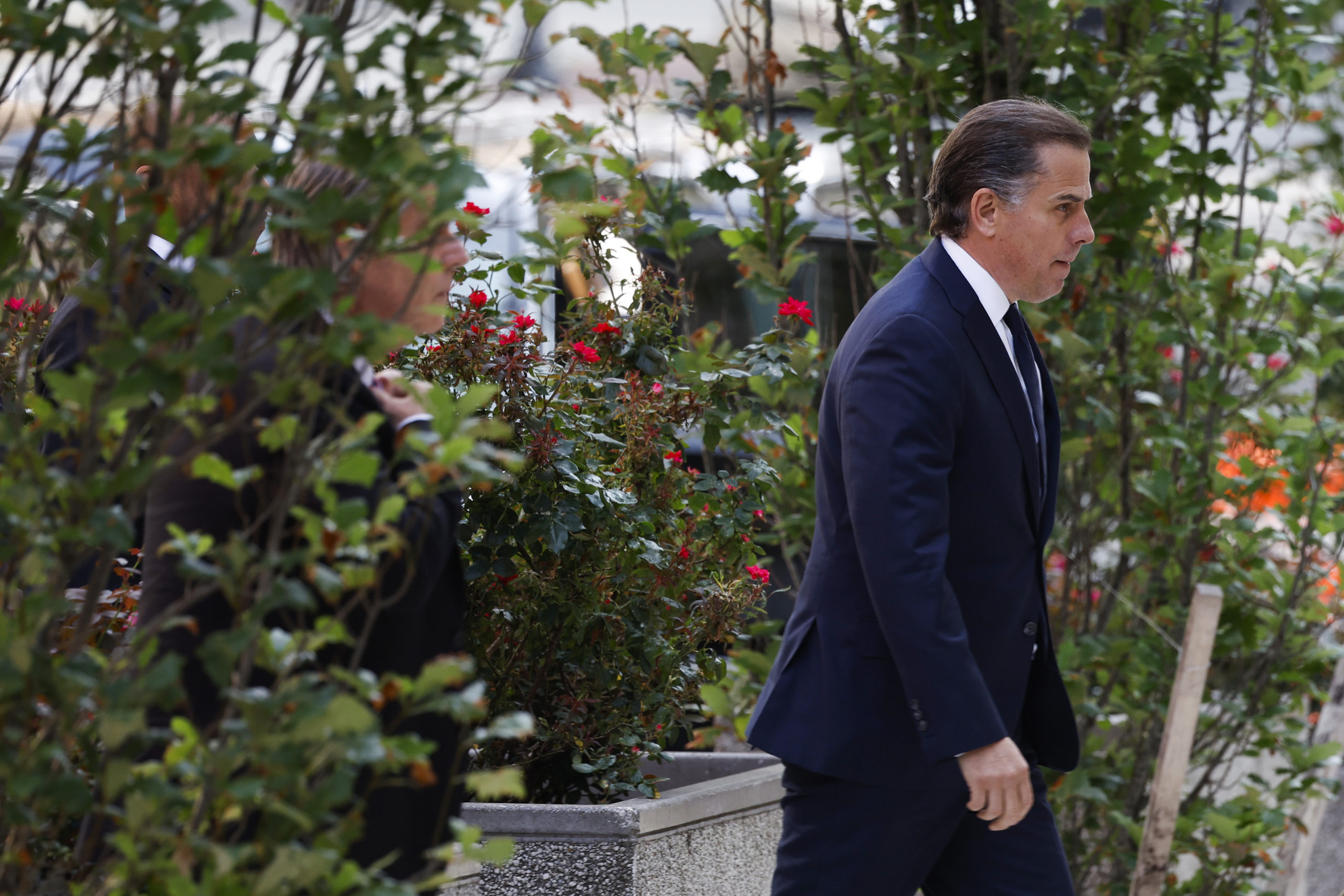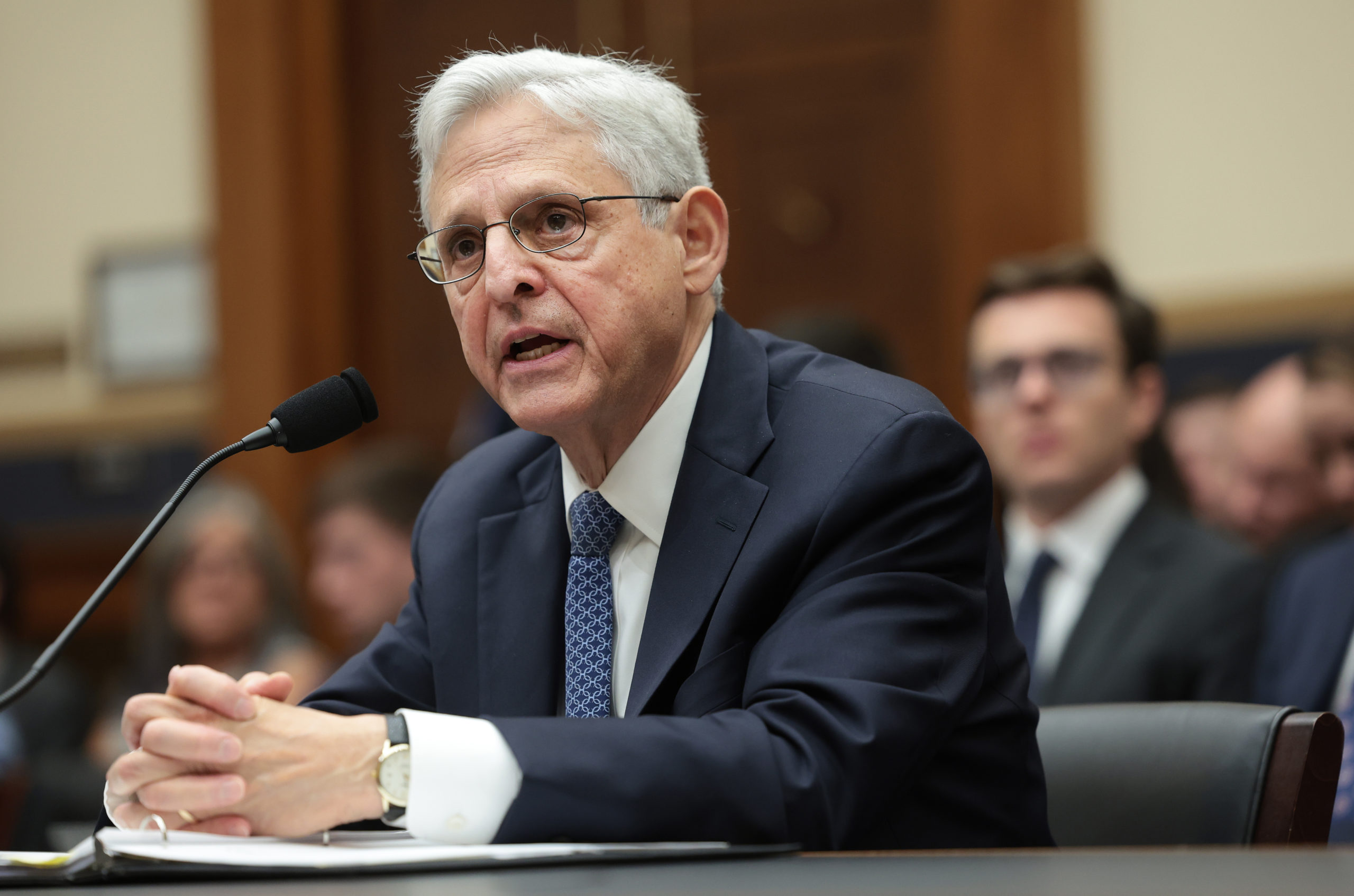Delaware U.S. Attorney David Weiss, special counsel in the ongoing Hunter Biden investigation, confirmed he needed approval from the Department of Justice’s (DOJ) Tax Division on his decisions during the case.
Weiss testified before the House Judiciary Committee on Tuesday and admitted that the DOJ Tax Division would have to approve tax charges leveled against Hunter Biden, even with his special counsel authority, according to a transcript of his testimony reviewed by the Daily Caller. (RELATED: DOJ Declined Top Hunter Biden Prosecutor’s Request For Additional Authority, Testimony Confirms)

WILMINGTON, DELAWARE – JULY 26: Hunter Biden, son of U.S. President Joe Biden, arrives to the J. Caleb Boggs Federal Building on July 26, 2023 in Wilmington, Delaware. Biden is in court to review a plea deal reached with federal prosecutors on misdemeanor tax charges. (Photo by Anna Moneymaker/Getty Images)
“I’m not going to comment on Tax Division approvals relative to this case. It would entail the deliberative process,” Weiss said. He was willing to speak about the general authority given to the Tax Division, without discussing the Hunter Biden investigation.
“I am aware of the Tax Division responsibilities under title — under the Code of Federal Regulations and the manual,” Weiss stated. He also expressed his understanding that the Tax Division is tasked with approving title 26 tax evasion offenses.
“I am aware that Tax Division approves the charging of title 26 offenses,” Weiss said. (RELATED: Special Counsel Investigating Hunter Biden Still Hasn’t Filled Out His Legal Team Months After Appointment)
The DOJ manual and federal regulations give the Tax Division authority to approve charges related to internal revenue, acting Deputy Assistant Attorney General for Criminal Matters at the DOJ Tax Division Stuart Goldberg testified to the House Judiciary Committee, according to a transcript reviewed by the Daily Caller.
Goldberg did not comment on the specific investigative steps DOJ Tax approved during the Hunter Biden case. He did tell the House Judiciary Committee Weiss would need DOJ Tax approval for tax charges even with his special counsel status.
Weiss confirmed DOJ Tax needs to approve investigative steps for tax cases while asserting that he was the final decision maker on the Hunter Biden matter.
“There are certain types of search warrants that require Tax Division approval, to my understanding,” Weiss said.
“But, if you’re working a tax case, there’s specific investigative steps that need the okay or approval of the Tax Division before you can initiate, correct?”
“That’s my understanding,” Weiss replied, according to a transcript of his testimony reviewed by the Daily Caller.
“Again, I didn’t need anybody’s permission. I made the decision. From my perspective, the Tax Division was more than comfortable with me making the decision,” Weiss added after a follow up question.
Weiss testified that he never ran into problems with the Tax Division and the approval process. If there was a disagreement, he could have appealed to higher ups at the DOJ.
“If Tax Division — if we came to an impasse — which, as I said, didn’t happen in this case — and I felt that my position was the one I wanted to pursue, and I felt that my course of action was the appropriate one, I could have appealed to the Deputy Attorney General or the Attorney General,” Weiss explained.
Later in his testimony, Weiss said he welcomed the assistance of the DOJ Tax Division on all aspects of the case because of their expertise and experience.
“I expect that Tax Division prosecutors, because this is the only type of work that they do, would be uniquely qualified to weigh in on all aspects of a tax prosecution, whether it’s sufficiency of the evidence or other matters,” Weiss stated.
He spoke more about his understanding of the DOJ Tax Division’s authority to approve charges or give discretion to a U.S. Attorney.
“My understanding — and, again, I’m no expert — is, if charges are approved by the Tax Division, the charges are going to proceed. If the U.S. Attorney’s Office decides not to be part of the case, Tax Division, on its own, will proceed with charges,” Weiss outlined.
“And when charges are denied, that means the U.S. Attorney’s Office absolutely cannot proceed with charges, correct?”
“That would be my understanding,” Weiss responded, according to a transcript of his testimony reviewed by the Daily Caller. He also mentioned the appeals process he discussed earlier in his testimony.
Weiss declined to discuss the specifics of the Hunter Biden case and said he could not recall a situation where he needed to use the appeals process.
Biden-appointed U.S. Attorney for the District of Columbia Matthew Graves testified to the Judiciary Committee in October and said Weiss needed “approval” from the DOJ Tax Division to bring charges against Hunter Biden. Graves also confirmed his decision not to partner with Weiss on potentially bringing tax charges in his district against Hunter Biden.
Weiss said he had “ultimate authority” on the Hunter Biden case in a letter he wrote on June 7 to House Judiciary Committee Chairman Jim Jordan. However, he wrote another letter to Jordan later that month saying his authority was geographically limited.
Hunter Biden pleaded not guilty to two tax misdemeanors in July after his guilty plea agreement fell apart under scrutiny from Delaware U.S. District Court Judge Maryellen Noreika.
Attorney General Merrick Garland testified before the Judiciary Committee in September and insisted Weiss had “full authority” on the Hunter Biden case. He deferred to Weiss on the granular details of the investigation and defended Weiss’ integrity.

WASHINGTON, DC – SEPTEMBER 20: U.S. Attorney General Merrick Garland testifies before the House Judiciary Committee in the Rayburn House Office Building on September 20, 2023 in Washington, DC. The committee is holding an oversight hearing on the U.S. Department of Justice. (Photo by Win McNamee/Getty Images)
Garland appointed Weiss special counsel in August after Hunter Biden’s guilty plea fell apart and two IRS whistleblowers came forward with allegations the DOJ gave Hunter Biden special treatment under Weiss’ supervision.
Weiss filed a motion to dismiss Hunter Biden’s Delaware tax charges in August to potentially charge him in D.C. or the Central District of California. Noreika approved Weiss’ motion and the charges were dismissed. Weiss has not filed any new tax charges against the first son.
The House Ways and Means Committee released a trove of documents in September substantiating the IRS whistleblowers’ testimony before the committee. Weiss wrote a letter in July to Republican South Carolina Sen. Lindsey Graham where he denied key allegations made by IRS whistleblower Gary Shapley about his charging authority. (RELATED: Top Hunter Biden Prosecutor Confirms Key Detail Of IRS Whistleblower Testimony, Jim Jordan Says)
Hunter Biden was indicted in September on three federal gun charges related to an October 2018 purchase of a firearm while he battled an addiction to crack cocaine.
He pleaded not guilty to the gun charges in October and downplayed them in a recent USA Today op-ed.
Henry Rodgers contributed to this report.


